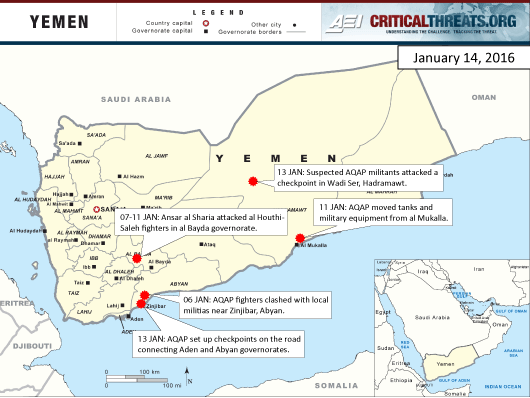This situation report was updated at 16:00 ET after a previous draft was published erroneously.
Al Qaeda in the Arabian Peninsula (AQAP) may be shifting resources from its support zone in al Mukalla, Hadramawt, to other fronts in Yemen, indicating the possible launch of a renewed campaign in al Bayda or southern Yemen or of a new campaign contesting control in Wadi Hadramawt. The potential inflection in AQAP’s ground campaign is occurring at a time when the group is also pushing forward its credentials within the global Salafi-jihadi movement.
AQAP may be moving resources from it sanctuary in al Mukalla, Hadramawt, to support current efforts along the frontline, possibly in al Bayda, or to open a new front, possibly in Wadi Hadramawt. AQAP mobilized tanks and other heavy weaponry from military bases in al Mukalla district on January 11, according to reports. The group moved resources northward along the road that runs east of al Mukalla through the Abdullah Gharib pass, which leads to a juncture at al Adwas, where there is also a military base. AQAP may either divert resources westward to Shabwah governorate or continue northward into Wadi Hadramawt. Rumors indicated AQAP may have deployed 100 militants from al Mukalla toward Shabwah earlier this week. AQAP has been able to move personnel and materiel through Shabwah to support ongoing efforts in Abyan and al Bayda. A January 13 attack on a Yemeni military checkpoint in Shibam, Hadramawt, may be linked to AQAP. The deployment of heavy artillery to the area would signal a campaign to expand AQAP control into Wadi Hadramawt, which grants greater access to smuggling routes running through Yemen’s Empty Quarter.
Ansar al Sharia, AQAP’s insurgent arm, continues to support anti-al Houthi groups along the frontline of Yemen’s conflict. The group claimed credit for 11 attacks on al Houthi-Saleh military targets in al Bayda and Ibb governorates between January 7 and 11. Ansar al Sharia also seized control of al Houthi positions in Taiz and proceeded to destroy “polytheist” shrines in the city. (Available through SITE.) AQAP is expanding its base of operations by developing links to local militias fighting against the al Houthi-Saleh alliance.
AQAP is reconstituting within its former safe havens in Abyan governorate. Ansar al Sharia militants clashed with local popular militias near the AQAP-held towns of Zinjibar and Ja’ar in Abyan governorate on January 5, likely in an effort to quell resistance. AQAP also established checkpoints just outside of Zinjibar on the main road linking Aden and Abyan governorates on January 13, the first such security measure since the group recaptured Zinjibar and Ja’ar in December 2015. The Saudi-led coalition has not prioritized establishing control over Abyan since coalition-backed forces pushed out al Houthi-Saleh militias in August 2015, allowing AQAP to rebuild where it had once operated under the “Emirate of Waqar.”
Recent AQAP media releases highlight AQAP’s preeminence in the global Salafi-jihadi community. The group released a series of video and audio statements featuring leadership in recent weeks. AQAP’s chief bombmaker Ibrahim al Asiri eulogized militants recently executed by Saudi Arabia. (Available through SITE.) This was Asiri’s first speaking role in any AQAP media production, and the group is likely attempting to use his notoriety to reaffirm their credentials as a leader of jihad against the West, as they have with video statements by former Guantanamo detainee Ibrahim Ahmed Mahmoud al Qosi.
The ongoing Yemen conflict continues to allow AQAP to extend its influence in Yemen through military action and media campaigns, while also taking on a governing role in an ever-expanding area in Yemen’s southeast. AQAP will develop an increasingly resilient safe haven in the region.
Jon Diamond contributed research to this piece.

